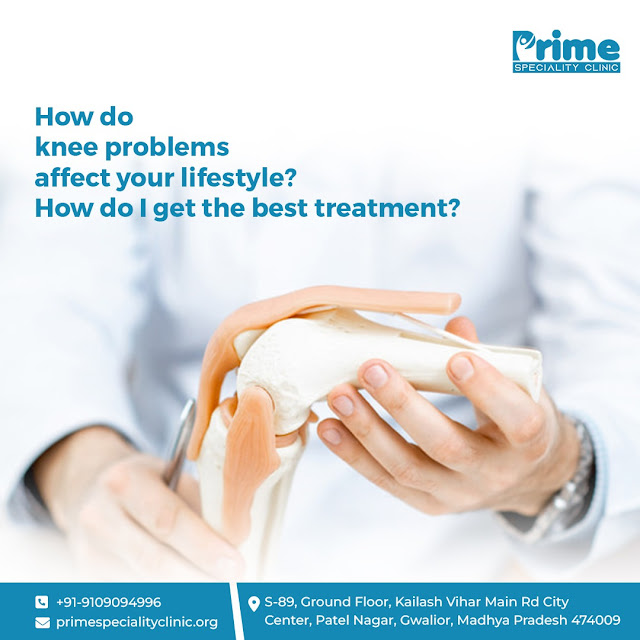How do knee problems affect your lifestyle? How do I get the best treatment?
Your total quality of life may be significantly impacted by knee issues. Walking, running, leaping, and other actions all depend on the knee joint, a complicated mechanism. A damaged or ill knee joint can result in pain, stiffness, and movement problems that make it difficult for you to carry out daily tasks.
Although knee
issues can significantly affect your way of life, there are a number of
treatment choices that can help you control your symptoms and enhance your
quality of life. You may successfully manage your knee issues and resume your
favorite activities by seeking the advice of a surgeon in the Knee Surgery Hospital In Gwalior,
following their suggestions, and making necessary lifestyle modifications.
How do knee problems affect your
lifestyle?
Your lifestyle may
be impacted by knee issues in a number of ways. Here are a few typical ways
that knee issues might interfere with your normal activities:
● Chronic discomfort brought on by knee issues
might make it difficult to carry out simple tasks like walking, using the
stairs, or bending over.
● Knee issues can restrict your mobility and range
of motion, making it challenging to engage in flexible tasks like getting in
and out of a car or picking things up off the ground.
● Knee issues might make it difficult for you to
exercise, which can result in weight gain, weakened muscles, and general ill
health.
● Your ability to perform your job duties may be
hampered by knee problems, especially if you must stand for extended periods of
time or perform physically demanding tasks.
● Knee problems may make it difficult for you to engage in social activities like sports, hobbies, and other leisure activities.
What are some common
Alternatives for the treatment?
As soon as
possible, seek treatment for knee problems to avoid further damage and improve
your quality of life. Here are a few common treatments for knee issues:
Physical exercise: Physical therapy can help by improving flexibility,
relieving pain, and bolstering the knee's supporting muscles. A physical
therapist can develop a special treatment strategy based on your particular
needs and goals.
Medication:
Two over-the-counter medications, acetaminophen, and ibuprofen, can help reduce
discomfort and inflammation. Your doctor can also suggest stronger medications
or corticosteroid injections to relieve inflammation.
Surgery: If
conservative therapy fails, your doctor may recommend surgery, such as knee
arthroscopy or knee replacement surgery, to repair or replace damaged knee
joint components.
Changes in lifestyle: Making lifestyle adjustments, such as losing weight,
using supportive shoes, and avoiding high-impact activities, can help to lessen
stress on the knee joint and ease symptoms.
Why choose the best treatment?
The optimum course
of action for your knee issues will depend on a number of variables, including
the severity of your ailment, your general health, and your particular
objectives. Here are some suggestions for selecting the ideal knee pain
treatment:
Consult a professional: Based on your unique requirements, a knee expert can
assess your problem and suggest the best course of action.
Examine your objectives: When selecting a course of therapy, think about your
personal objectives. For instance, a more intensive treatment approach may be
required if your goal is to return to a particular activity rather than just
lessen discomfort and increase mobility.
Analyze the advantages and risks: Before choosing a course of therapy, weigh the
advantages and disadvantages. For instance, compared to conservative therapy, surgery
may have a greater risk of complications.
Pay attention to your doctor's advice: To guarantee a positive outcome, closely adhere
to your doctor's advice and show up at all follow-up appointments.
Conclusion:
Although knee issues might significantly affect your way of life, there are a number of efficient treatment alternatives available. You may pick the best Knee Replacement Hospital in Gwalior for your knee issues and raise your quality of life by talking to a professional, thinking about your objectives, weighing the risks and advantages, and heeding your doctor's advice.

.jpg)

Comments
Post a Comment